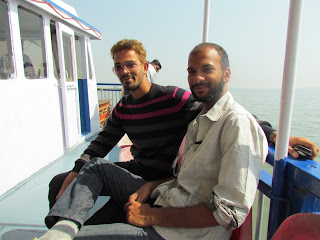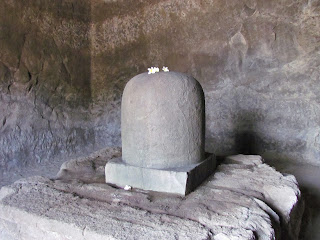I decided that I wanted to start with the most basic tourist traps: The Gateway of India and Elephanta Island. To get to the Gateway I had to take a train.
Taking the train in Mumbai is a bit like taking the train in Manhattan at rush hour, only it's always rush hour, there are a zillion more people, and all the signs appear to be in Hindi. The signs are actually also in English, but it is in very very small print which is not helpful when one is nervous. Also, I should reiterate that I am living in a very working class part of Mumbai which means that as far as I can tell, I am the only white woman who is bound to take the train from Santacruz Station anytime this winter. If I were to calculate the ratio of men to women of any color standing in line for train tickets I'd say there were approximately 20 men to each woman.
It is not so much that Mumbai men seem to dislike women, or me in particular, but there is a certain overt sexism that permeates the streets, add to that that I was a cog in the smooth running line at the ticket window in that I didn't know how much my ticket would be and so had to ask a question and wait for an answer and I felt a bit unwelcome. Men were trying to jump in front of me in line and one even subtly tried to take my change at the ticket window. Thankfully the man behind the counter smacked the would be thief on the hand and had me take my 4rs, which is about 9 cents. It was one of many moments where I was (and, I'm sure, will be) torn about money in this country. That man needed my nine cents, nine cents mattered to him. At home, I might be inclined to leave that kind of change in the "Take a Penny" tray, or, most certainly, in the Charity of Choice box on the counter. But here, it felt important to not let myself be taken for that 9 cents. So, I took it back from the man.
After asking for directions to the right platform, I descended the steps to wait for a train. It was in those few minutes of navigating the stairs that I felt for the first time how truly crowded this country is and how people here just move through the throngs seemingly without any care for the other humans around them. I understood why people so often get trampled in India. I was, I admit, very nervous walking down the steps. I was aware of how much adrenaline I must have been using just to have gotten that far without having a panic attack.
On the up side to train travel in Mumbai, are the Women Only cars. Here, at least, there is a sense of ease. For an hour I stood in the door of the train, which was wide open to the world and watched the city flash by. I saw families bathing in sewer water on the edge of the tracks, men naked and defecating, rats playing, children sorting through layers of trash that seemed to be limitless. Warrens of homes built out of corrugated steel sheets and tarp and, well, all those things you've probably seen in Slumdog Millionaire. I wanted to take pictures, but thought the native women on the train might think it rude. Eventually, though, I pulled out my camera, when the city started to get a little more "pulled together" and snapped away through my moving window.
Before I go any further, I should tell you about Harish and Zeeshan. Harish is a young friend of my dear college buddy, Gary. The two met several years ago when Gary started coming over to India for work. Harish friended me on facebook a while ago and we have exchanged brief "hellos". We spoke for the first time yesterday morning and when I told him that I wanted to go to Elephanta he arranged for his friend Zeeshan to meet me at the Gateway to accompany me on my journey.
Thank goodness for my Indian mobile. As you can see, even though this was a slow day, the Gateway is a bit of a mob scene.
 |
| The famous Taj Hotel is right behind the Gateway |
 |
| Even the dogs hang out at the Gateway |
 |
| Zeeshan and Assam |
When we returned to the boat I told Zeeshan I was exhausted and needed to return home; they stayed on the island and we went our separate ways. On the boat, a man came up to me who had been in authority on the Island. He asked me if "those boys" were my guide. I said, "no, they were friends of a friend and they were escorting me as a courtesy." He said, "Oh, friend of a friend is okay. But you see, lately these boys are meeting young women at the gateway and offering to be their guide and then touching them. I tell them it is bad for India. These tourists will not come back." I assured him nothing like that happened. I also wondered if he meant Zeeshan and Assam in particular when he said, "these boys," or if he meant, "some boys." I guess I'll never know. I was glad, however, to have been under the protective watch of Harish. Though, if Harish had not insisted I let him help, I would have happily gone on my own and not have thought of having a "guide".
For Harish's sake, I told him the trip had been wonderful and uneventful. I did not want to embarrass him. He said, "I am glad." When I told him how thankful I was for his help he said, "It is my duty."
This is another thing about India that I am getting wind of, "Duty". The confusing thing is that I do not understand what my duty is. Was it my duty to absolutely insist that I pay for the ticket that Zeeshan and Assam ended up paying for? I tried to pay them back several times, to no avail. "Duty" is such a strange concept. "Respect", "gratitude", "going dutch", "tipping," are all things I get, but the Indian concept of "Duty" is murky.
I guess I'll add it to the list of things to investigate.
Needless to say, after I got the train home, tried haggling for a few tangerines at the farmers market at the foot of the station, I was spent. I whiled away the evening watching tv and trying to stay awake long enough that I wouldn't be up at 2 a.m. It didn't work. I was up at 2. Thankfully, I was also so deeply tired that after a half hour or so, I went right on back to sleep.
 |
| A couple of the monkeys that "guard" Elephanta Island |









6 comments:
I so look forward to your installments! I really cannot wait to see and read each days events. It's something like the old serials in the newspaper or magazine which released a new chapter each week or month. Thankfully, you're a daily correspondent. I'm delighted with today's news and here's looking to tomorrow's!......
Mott Green talked to us recently a bit about this concept of duty in connection with the Hindu world view presented in the Ramayana. He said, among other things, that the idea is you're born into this world with a certain set of challenges that are appropriate for you, and choosing the right path for you through those set challenges - the best and most correct performance of your assigned role in the world - is what constitutes your duty. The proper performance of that role - in Harish's case perhaps including his role as your friend and guardian in a culture new to you - helps to keep order in the world and leads to betterment spiritually for yourself. It can't better your position in the world, only the circumstances specific to your role - which is one of the harder notions for westerners - and as you refine and perfect your duty you move towards a transcendental freedom WITHIN that role.
I'm still trying to get my brain around this myself, but maybe there's something helpful there somewhere as you see it in action day to day!
I can't believe your bravery - you're like those 19th century British women who headed off into the desert on camels with nothing but a butterfly net and a teapot. Rule Morganna!
I, too, you must know my darling, eagerly await your postings....Your writing is so detailed and layered, and compelling....and o Lordy, you ARE so brave, and, thankfully, thoughtful and watchful. I'm glad you got that new camera..your photos are fantastic....be well, sleep well, I love you. P.S. i see Margaret compared you to one of those 19th century British women...high-praise, eh!
Marianne...I can't guarantee that I'll write daily, but if I have few days like today, I can skip a few later on.
Margaret....Thank you for this. Payel said something tonight that resonates with this explanation. I told her how much I admired what she and Rajiv manage to do on so many levels for other people and she said we all have a job to do, everyones job is different, we all work within the space we are given.
Mom....I love you.
I'm new to your blog; it's recommended by my brother, who was a close friend of your father's. I have spent a lot of time in India (for an American), and I'll have things to say... Rather than organize, I'll just blurt out.
I go with an empty suitcase. Clothing is cheap, I love wearing Indian clothes, & I fit in better. The first thing I do is go buy a couple of saris and suits.
Saris can be made on a wasteband; fancy fashionable ones, heavy with jewels, are sometimes done that way - you could wear them without fear of stepping on your skirt and falling apart.
North Indians, who can be very fair and sometimes blue eyed,
wear Punjabi suits, which are versatile, cool, and comfortable. They are also quite demure. The dupatta,or chunni ("thing") is meant to cover your breast (as if it weren't already incased in bra & suit...), and are also feminine and fun, but see for yourself.
Nancy
I'll just add, the duty to a guest in India is major and especially charming. The guest has no duty, although your hosts may someday become your guests. One thing you can do: if a host admires something of yours, give it to them. I've been told, "Westerners have a lot of little Thank you's".
Nancy
Post a Comment